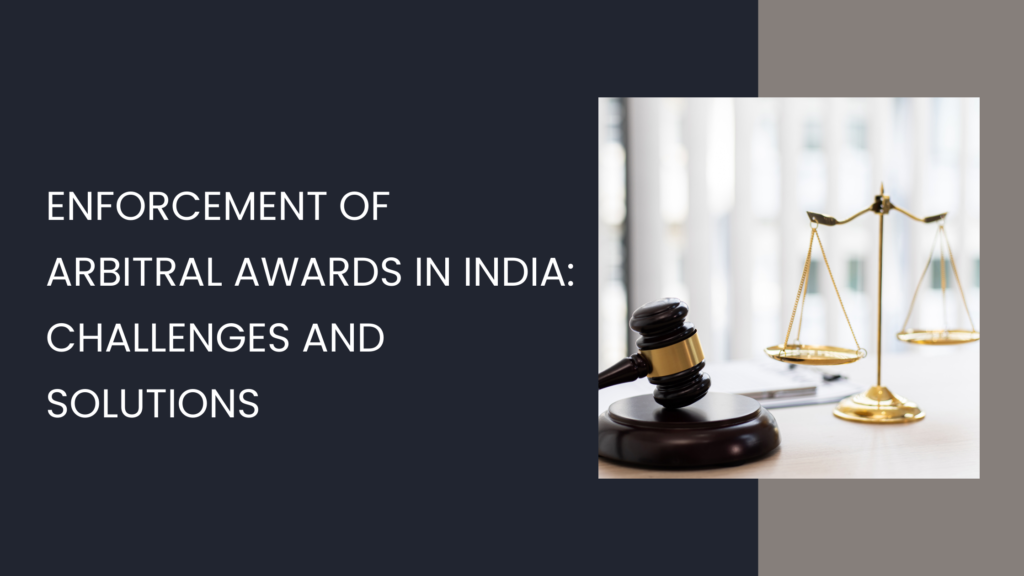Arbitration has long been lauded as a preferred method of dispute resolution due to its efficiency and confidentiality. However, the effectiveness of arbitration is significantly dependent on the successful enforcement of arbitral awards. In India, while arbitration is well-regulated, the enforcement of arbitral awards can present several challenges. This blog delves into these challenges and explores potential solutions to streamline the enforcement process.
Understanding Arbitral Awards
An arbitral award is the decision made by an arbitrator or arbitral tribunal resolving a dispute. Once rendered, the award must be enforced to have legal effect. In India, the enforcement of arbitral awards is governed by the Arbitration and Conciliation Act, 1996, and its subsequent amendments. The Act provides a framework for recognizing and enforcing both domestic and international arbitral awards.
Challenges in Enforcement of Arbitral Awards
- Judicial Intervention and Delay
One of the primary challenges in enforcing arbitral awards in India is the involvement of the judiciary. Despite the Arbitration and Conciliation Act promoting minimal court intervention, there are instances where parties challenge awards on various grounds, such as alleged procedural irregularities or the arbitral tribunal’s jurisdiction. These challenges can lead to delays in enforcement.
Solution: To address this, courts must adhere strictly to the principle of minimal intervention. Streamlining judicial processes and expediting hearings can help mitigate delays. The introduction of specialized commercial courts and fast-track procedures for arbitration-related cases could also enhance efficiency.
- Grounds for Refusal
The Act outlines specific grounds on which an arbitral award can be refused enforcement, including situations where the award is deemed to be in conflict with the public policy of India. The term “public policy” is broad and subjective, leading to varied interpretations by different courts.
Solution: Clarifying the definition of “public policy” through legislative amendments or judicial guidelines can reduce ambiguity. Additionally, promoting consistency in judicial decisions will help in creating a more predictable enforcement environment.
- Challenges in International Arbitration
Enforcing international arbitral awards can be particularly challenging due to the need to navigate both domestic and international legal frameworks. The Indian legal system must align with international standards to facilitate smooth enforcement.
Solution: India is a signatory to the New York Convention on the Recognition and Enforcement of Foreign Arbitral Awards, which provides a framework for enforcing international awards. Strengthening adherence to the Convention and adopting practices in line with international norms can help improve enforcement.
- Recognition of Awards Rendered in Arbitrations Conducted Outside India
In cases where the arbitration proceedings occur outside India, the process of recognizing and enforcing foreign awards can be cumbersome. Indian courts must consider both domestic and international legal standards when dealing with such cases.
Solution: Implementing a clear, streamlined process for recognizing and enforcing foreign arbitral awards, supported by clear guidelines and efficient judicial procedures, can simplify this process.
- Complexity and Cost
The complexity of the enforcement process and associated costs can deter parties from pursuing enforcement actions. Prolonged legal battles and high litigation costs can negate the benefits of arbitration.
Solution: Reducing procedural complexities and associated costs through reforms in the arbitration and enforcement processes can encourage more effective enforcement. Providing cost-effective legal assistance and support for parties can also alleviate financial burdens.
Recent Developments and Reforms
Recent amendments to the Arbitration and Conciliation Act, such as those in 2015 and 2021, have introduced several reforms aimed at improving the arbitration process, including the enforcement of awards. These amendments emphasize the need for expeditious resolution and limit grounds for challenge, which can potentially address some of the aforementioned challenges.
Conclusion
While the enforcement of arbitral awards in India has made significant strides, challenges remain that require ongoing attention. By addressing judicial delays, clarifying the grounds for refusal, aligning with international standards, and simplifying processes, India can enhance the effectiveness of arbitration as a dispute resolution mechanism. Both legislative and procedural reforms, coupled with a commitment to consistency and efficiency, will pave the way for a more robust arbitration ecosystem.


